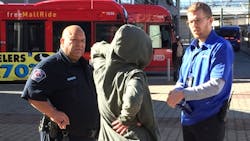USDOT’s HOPE Grant to strengthen Denver RTD’s efforts to help homeless people
The Denver Regional Transportation District (RTD) was awarded a $180,000 Helping Obtain Prosperity for Everyone (HOPE) grant from the U.S. Department of Transportation (DOT) that will further the agency’s efforts to provide essential services to metro residents experiencing homelessness, and better coordinate ridership needs with nonprofits and other assistance providers.
The grant will allow Denver RTD to hire a full-time community outreach coordinator on issues affecting homeless residents. Denver RTD says it has a complex relationship with the homeless services community: Many of those who are homeless rely on public transit for essential rides, but Denver RTD’s other customers often express intimidation or discomfort by people sleeping in waiting areas or riding buses and trains all day for shelter, says the agency.
Denver RTD started a homelessness task force more than a year ago to bring together transit officials with those working full time on homelessness issues and services. The federal grant allows Denver RTD to hire a specialist to survey individuals experiencing homelessness and service agencies for needs, and to serve as the liaison for planning solutions.
“It fits very well with what we’ve been trying to do,” said Bill Sirois, senior manager of Transit Oriented Communities for Denver RTD.
In addition to seeking closer coordination with other service agencies, Denver RTD has also established full-time mental health professionals to ride along with security staff, de-escalate confrontations and link people with shelter services and counseling.
The new hire would first survey other service agencies and people currently using Denver RTD vehicles or facilities to establish the most pressing needs. Sirois mentioned the following two possible goals for the work, among others:
Nonprofit partners, such as Colorado Coalition for the Homeless, support Denver RTD’s LiVE program by offering passes to low-income residents, but they would like to be able to print out official cards at their sites. The grant may help to pay for such printers.
Need already exists among those experiencing homelessness for added transportation to shelters, medical services and social services. The grant money can help pay for consulting on Denver RTD route planning that would better serve those needs amid current budget limitations.
“We’re grateful to federal transportation officials for these added resources to explore how to better serve our most vulnerable communities,” Sirois said.
Denver RTD security leaders are also pursuing funding to expand the mental health co-responders program.
